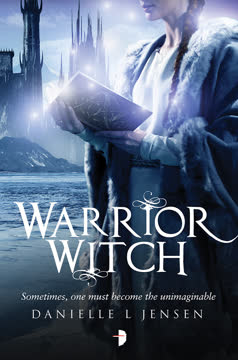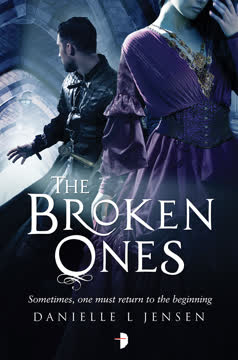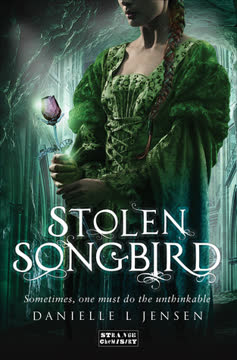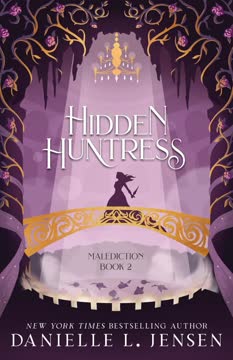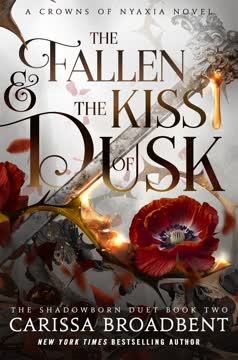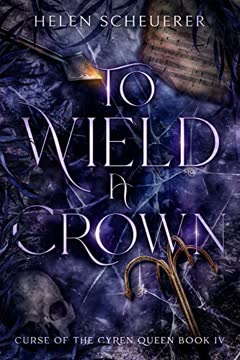Plot Summary
Aftermath in the Snow
In the wake of the curse's breaking, Cécile and Tristan face a world thrown into chaos. The trolls are free, but the cost is immediate: suspicion, fear, and political upheaval. Tristan must assert his claim to leadership, but the humans are wary, and the Regent's death at the hands of his own son—under troll compulsion—shatters any hope of a smooth transition. Cécile, haunted by her role in unleashing the trolls, is isolated and wracked with guilt. The city of Trianon is on edge, and the threat of violence looms as alliances fracture and old wounds reopen. Both Cécile and Tristan are forced to confront the consequences of their choices, setting the stage for a struggle not just for power, but for the soul of the Isle.
Compulsions and Consequences
As the political situation deteriorates, the true cost of magical compulsion becomes clear. Aiden, the Regent's son, is driven to patricide by a promise made to the troll king, and the resulting chaos leaves the city leaderless. Marie, the Regent's widow, must step into a role she never wanted, while Cécile and Tristan are forced to hide the truth to protect those they love. The lines between victim and perpetrator blur, and the weight of guilt presses down on everyone. The compulsion magic, once a tool of control, now threatens to unravel the fragile alliances holding the city together, and the specter of betrayal haunts every decision.
The Witch's Bargain
Seeking answers and leverage, Cécile bargains with the Winter Queen, offering her favorite song in exchange for a glimpse into the plans of their enemies. The encounter is harrowing, revealing the fey's alien morality and immense power. The Queen's interest in Tristan and Cécile's bond is unsettling, and her request for a meeting with Tristan hints at deeper, more dangerous games. The price of the bargain is steep—Cécile loses her song and a piece of herself, while the information gained reveals that Angoulême, not the troll king, is the true threat. The fey's involvement complicates an already perilous situation, and the cost of magic becomes ever more personal.
Blood and Betrayal
The struggle for control intensifies as Angoulême manipulates Roland and Lessa, using oaths and deception to build an army of humans and trolls. Betrayals abound: Aiden's mind is shattered by compulsion, Marie murders a traitor to protect her son, and Cécile is forced to confront the consequences of her actions. The lines between friend and foe blur, and the cost of victory grows higher. The city is beset by violence from within and without, and every alliance is tested by blood and betrayal.
Fey in the Frost
The Winter Queen's power manifests in the world as unnatural cold and monstrous wolves stalk the streets. Cécile and Sabine are hunted, forced to rely on iron and quick thinking to survive. The fey's magic is revealed to be both alluring and deadly, and their motives remain inscrutable. The city is transformed into a frozen labyrinth, and the threat of the fey becomes as dire as that of the trolls. The struggle for survival becomes a battle on multiple fronts, with the fey's games threatening to tip the balance of power.
The Winter Queen's Game
The Winter Queen's true intentions begin to surface as she seeks to use Cécile and Tristan for her own ends. Her desire for Tristan's name and power is a threat that cannot be ignored, and her ability to manipulate reality itself makes her a formidable adversary. The fey's games are deadly, and the cost of losing is annihilation. Cécile and Tristan must navigate a web of illusion and compulsion, struggling to maintain their autonomy in the face of overwhelming power.
Oaths and Alliances
With enemies on all sides, Cécile and Tristan are forced to consider alliances with former foes. The possibility of joining forces with the troll king to defeat Angoulême is fraught with peril, and the weight of old grudges threatens to undermine any hope of cooperation. Oaths, both magical and personal, bind and constrain the characters, forcing them into choices they would rather not make. The cost of trust is high, and the price of betrayal higher still.
Wolves in the Night
The city is beset by supernatural threats as the fey's wolves and the trolls' unleashed power wreak havoc. Cécile and her friends are forced into desperate measures to survive, relying on iron, cunning, and the strength of their bonds. The line between hunter and hunted blurs, and the true nature of the threats facing the Isle becomes clear. Survival requires sacrifice, and not everyone will make it through the night unscathed.
The Price of Power
Tristan and Cécile grapple with the consequences of their power and the responsibilities of leadership. The use of magic comes at a steep price, both physically and emotionally, and the burden of command weighs heavily. The need to protect those they love conflicts with the demands of war, and every decision carries the risk of unintended consequences. The struggle to balance personal desire with the greater good becomes a central conflict, and the cost of power is measured in blood and loss.
Shattered Loyalties
The bonds between characters are tested to the breaking point as betrayal, sacrifice, and death take their toll. Marc's tragic fate, the twins' suffering, and the loss of friends and family leave deep scars. The pain of loss is compounded by the knowledge that many wounds are self-inflicted, the result of choices made in desperation. Loyalty is both a strength and a weakness, and the struggle to hold on to hope in the face of overwhelming grief is a battle in itself.
The Weight of Names
Names hold immense power in this world, and the struggle to protect, conceal, or wield them is a recurring theme. The fey's desire for Tristan's name, the compulsion of oaths, and the binding of magic all hinge on the knowledge and use of true names. The danger of names is ever-present, and the characters must navigate a landscape where a single word can mean salvation or destruction. The burden of identity and the risk of being known are central to the story's emotional core.
The Sins of Kings
The sins of the past haunt the present as the consequences of the troll king's actions come to light. Thibault's history of cruelty, betrayal, and lost love is revealed, casting new light on the struggles of his children. The weight of legacy is heavy, and the desire to break free from the cycle of violence and vengeance is a driving force. The cost of rule is measured in lives lost and hearts broken, and the hope for redemption is fragile.
The Human Shield
Angoulême's strategy of using humans as a shield is brutally effective, forcing Tristan and Cécile into impossible choices. The siege of Trianon is a nightmare of violence and moral compromise, as the defenders are forced to fight their own people. The cost of victory is high, and the line between hero and villain blurs. The true horror of war is laid bare, and the hope for a better future seems ever more distant.
The Spell of Severance
In a desperate bid to protect each other, Cécile and Tristan use a spell to sever the emotional bond between them, allowing for greater autonomy but at the cost of intimacy. The pain of separation is acute, and the risk of losing each other becomes all too real. The spell is both a blessing and a curse, and the struggle to maintain connection in the face of overwhelming odds is a central emotional conflict.
The Battle for Roland
The climactic battle between Tristan and Roland is a brutal contest of power, will, and love. Roland, manipulated and broken by Angoulême, is both victim and villain, and Tristan's struggle to save rather than kill his brother is heart-wrenching. The cost of compassion is high, and the hope for redemption is balanced against the risk of total destruction. The battle is not just for the Isle, but for the soul of a child.
The Siege of Trianon
The siege reaches its peak as the defenders of Trianon are pushed to the brink. Cécile's magic, Marc's leadership, and the courage of the city's inhabitants are all tested as Angoulême's forces breach the walls. The arrival of unexpected allies and the use of every available resource turn the tide, but not without devastating loss. The cost of survival is measured in lives and innocence lost, and the hope for peace is fragile.
The Poison Within
The true nature of the trolls' affliction is revealed: iron is a poison that has corrupted their magic and made them mortal. Cécile and her allies discover a way to cure the trolls, stripping away the iron and restoring their fey nature. The process is painful and fraught with risk, but it offers a path to salvation. The hope of sending the trolls back to Arcadia becomes a possibility, but the cost is high, and not everyone will survive the cure.
The Last Stand
The last battles are fought with desperation and fury. Angoulême is finally defeated, but not before inflicting terrible wounds on his enemies. Lessa's ambition leads to her downfall, and Marc's sacrifice is a devastating blow. The end of the war is both a victory and a tragedy, as the survivors are left to pick up the pieces of a shattered world. The time of the trolls is over, and the survivors must find a way to move forward.
The End of Trollus
With the trolls cured and sent back to Arcadia, Tristan seals Trollus, ending an era. The city, once a place of magic and wonder, becomes a tomb, its secrets buried beneath the mountain. The survivors must find new purpose in a world forever changed, and the hope for a better future is tempered by the weight of all that has been lost. The end of Trollus is both a mourning and a liberation, and the path forward is uncertain.
The Debt of Summer
The Summer King calls in Cécile's debt, demanding the return of all his people to Arcadia—including Tristan. The price of magic is separation, and the lovers are torn apart once more. The pain of loss is overwhelming, but the hope for reunion remains. The cost of victory is measured in love and sacrifice, and the true meaning of power is revealed to be the ability to let go.
The Final Farewell
Cécile lives out her mortal life, raising her son and building a legacy in the world she helped save. Tristan, immortal and exiled, watches from afar, his love undiminished by time or distance. The pain of separation is ever-present, but the hope for reunion endures. The passage of time brings healing and change, but the scars of loss remain.
Immortal Reunion
In the end, death is not the end. Cécile's soul is drawn to Arcadia by the bond she shares with Tristan, and the lovers are reunited in a world beyond time. The pain of loss is transformed into the joy of reunion, and the hope for a life together is finally realized. The story ends not with an ending, but with a beginning—a promise that love endures beyond all boundaries.
Characters
Cécile de Troyes
Cécile is the heart of the trilogy—a young woman whose journey from innocence to hard-won wisdom is marked by sacrifice, guilt, and love. Her magical voice and witch's power make her both a weapon and a target, but it is her compassion and determination that define her. Cécile's relationships—with Tristan, her family, and her friends—are the source of her strength and her greatest vulnerability. She is tormented by the consequences of her choices, especially the unleashing of the trolls and the deaths that follow. Her arc is one of atonement and growth, as she learns to balance personal desire with the needs of the many. Ultimately, her willingness to pay any price for those she loves is both her greatest strength and her deepest wound.
Tristan de Montigny
Tristan is a prince shaped by trauma, duty, and the weight of impossible choices. His intelligence and magical prowess make him a formidable leader, but his compassion and guilt often undermine his confidence. Tristan's relationship with his father is a source of deep pain, and his struggle to break free from the cycle of violence and tyranny is central to his arc. His love for Cécile is both a salvation and a curse, driving him to acts of heroism and self-destruction. Tristan's journey is one of learning to accept help, to trust, and to let go of the need for control. His ultimate sacrifice—leaving the world he fought to save—cements his legacy as a tragic, noble hero.
Angoulême
The Duke d'Angoulême is the primary antagonist, a troll whose genius for strategy is matched only by his capacity for cruelty. He manipulates oaths, compulsion, and fear to build an army and control those around him, including Roland and Lessa. Angoulême's inability to trust or love leaves him isolated and ultimately doomed. His psychological complexity lies in his self-loathing and the projection of his pain onto others. He is a cautionary figure—a warning of what power without empathy becomes.
Roland de Montigny
Roland is both victim and villain—a child twisted by compulsion, isolation, and the poison of iron. His immense power is a threat to all, but his madness is not of his own making. The tragedy of Roland is the loss of potential, the corruption of innocence, and the cost of neglect. His eventual cure and exile to Arcadia offer a glimmer of hope, but his arc is a reminder of the damage wrought by those who use others as tools.
Lessa
Lessa is a survivor, shaped by abuse and a relentless drive for power. Her ability to play both sides makes her a dangerous ally and a formidable foe. Lessa's psychological complexity lies in her capacity for self-deception and her willingness to sacrifice anything for the crown. Her downfall is the result of her inability to trust or love, and her death is both a victory and a tragedy.
Marc
Marc is the moral center of the story—a friend whose loyalty and courage are unwavering. His disfigurement and suffering make him an outsider, but his wisdom and compassion make him indispensable. Marc's relationship with Cécile and Tristan is one of mutual respect and deep affection. His ultimate sacrifice is a devastating loss, but his legacy endures in the lives he touched.
Victoria and Vincent
The twins are a study in duality—witty, irreverent, and fiercely loyal to each other and their friends. Their bond is unbreakable, and their suffering is shared. Vincent's affliction and Victoria's grief are central to the story's exploration of loss and recovery. Their eventual transformation into fey and departure to Arcadia is bittersweet, marking the end of an era and the hope for a new beginning.
Marie du Chastelier
Marie is a survivor of trauma and loss, forced into leadership by circumstance. Her willingness to do whatever is necessary to protect her son and her people makes her both admirable and ruthless. Marie's arc is one of adaptation and resilience, as she navigates the treacherous waters of politics and war.
The Winter Queen
The Winter Queen is the embodiment of fey otherness—beautiful, terrifying, and utterly amoral. Her interest in Tristan and Cécile is both personal and political, and her games are deadly. She represents the danger of power without empathy, and her manipulation of the mortal world is a constant threat. Her eventual defeat is a victory, but her presence lingers as a reminder of the world's fragility.
The Summer King
The Summer King is a figure of immense power and inscrutable motives. His demand for the return of his people is both just and cruel, and his manipulation of Cécile and Tristan is a reminder of the cost of magic. Yet, his final act—allowing Cécile and Tristan to reunite in Arcadia—offers a measure of grace and hope.
Plot Devices
Compulsion and Oaths
The use of magical compulsion and binding oaths is central to the story's structure. Characters are forced into actions against their will, and the struggle to break free from these bonds is a recurring theme. The power of names, the danger of promises, and the cost of breaking or keeping them drive much of the conflict. This device is used to explore questions of agency, responsibility, and the nature of power.
Dual Narrative Structure
The story is told in alternating chapters from Cécile and Tristan's points of view, allowing for a rich exploration of their inner lives and the impact of events on their relationship. This structure heightens the emotional stakes and allows for a nuanced portrayal of love, guilt, and sacrifice.
Fey Bargains and Debt
The motif of bargains with the fey—especially the debts owed to the Summer and Winter courts—serves as both a plot engine and a source of tension. The unpredictable nature of fey magic, the danger of giving or owing favors, and the literal and metaphorical price of power are explored through these bargains. The narrative uses foreshadowing and delayed revelation to build suspense around the consequences of these deals.
Foreshadowing and Prophecy
The use of prophecy, visions, and foreshadowing is woven throughout the narrative, creating a sense of inevitability and tension. Characters struggle to interpret and resist the future foretold, and the tension between fate and free will is a central concern. The narrative structure uses these devices to build suspense and to explore the limits of knowledge and control.
Sacrifice and Redemption
The story is structured around acts of sacrifice—both voluntary and coerced—and the hope for redemption. Characters are forced to pay terrible prices for their choices, and the possibility of atonement is a driving force. The narrative uses parallel arcs and mirrored events to explore the cyclical nature of violence and the hope for breaking free.
Analysis
Warrior Witch is a sweeping, emotionally charged conclusion to a trilogy that interrogates the cost of power, the nature of love, and the possibility of redemption. At its core, the novel is about the consequences of choices—personal, political, and magical—and the ways in which individuals are shaped and constrained by the promises they make and the debts they owe. The story's use of compulsion, oaths, and fey bargains serves as a metaphor for the ways in which trauma, legacy, and love bind and define us. The alternating perspectives of Cécile and Tristan allow for a nuanced exploration of guilt, grief, and hope, and the narrative's willingness to embrace both tragedy and joy gives it a rare emotional depth. The ultimate message is one of hard-won hope: that even in a world scarred by violence and loss, love endures, and the possibility of healing and reunion remains. The novel's ending, with its promise of immortal life together beyond the boundaries of death and time, is both a reward for the characters' suffering and a testament to the enduring power of love and sacrifice.
Last updated:
Review Summary
Warrior Witch received mixed reviews from readers. Many praised it as an epic conclusion to the trilogy, with intense action and emotional moments. However, some felt disappointed by the ending, finding it bittersweet or unsatisfying. Readers appreciated the character development and complex plot twists. Criticisms included pacing issues and frustration with the protagonist's decisions. Despite divided opinions on the finale, most agreed the series was worth reading overall. The book left a strong impact on fans, with many expressing deep emotional reactions.
